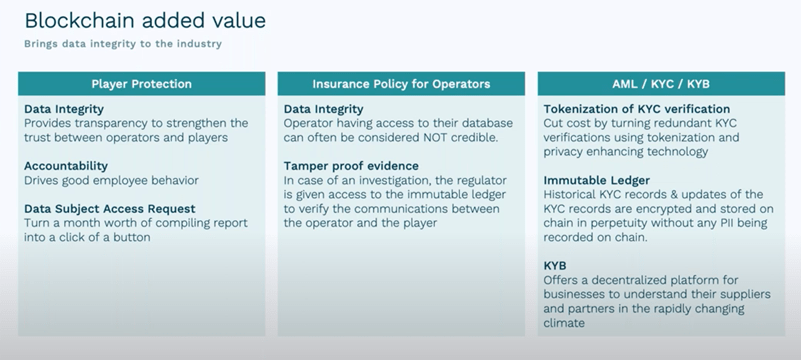|
Getting your Trinity Audio player ready...
|
On March 10, iGaming Business hosted a webinar on practical implementations for blockchain technology, safer gambling, and anti-money laundering (AML).
Many critics dismiss blockchain and the associated coins as nothing but a speculative asset attached to a distributed spreadsheet. However, as this insightful webinar shows, the technology is so much more than that, and it has the potential to revolutionize entire industries. Watch it or read a full summary below.
Introducing the webinar guests
This conversation involved:
- Rebecca Liggero Fontana, lead gaming industry video reporter, writer, interviewer & content creator at CoinGeek
- Ai Ishii, business development at nChain
- Nick Hill, founder of Premier Chain
- Paul Foster, CEO of Crucial Compliance
- Warren Russel, founder & CEO of W2
Ai Ishii on why blockchain can help with safer gambling and AML
Ai begins by addressing the elephant in the room: why the heck do we need blockchain? She notes that blockchain is one of the most controversial technologies she has ever worked with, mostly thanks to the pump and dump digital currency industry and the 2017 ICOs that never delivered.
Ai notes that the industry has changed a lot since then. The first blockchain to be adopted for its utility was Ethereum, but it’s too slow, doesn’t scale, and the transactions fluctuate wildly. All of this puts businesses off as they can’t forecast the costs of using blockchain technology.
However, Ai notes that some companies have solved the scaling issues. The technology has matured and is ready for everyday use, but we’re still at the beginning of the era of adoption.
What are the main benefits of blockchain for the iGaming sector?
(i) Anonomyzing data using hash technology.
(ii) The immutable ledger develops trust.
Ai outlines the various problems blockchain technology can help within the industry. These include the societal damage of problem gambling in the United Kingdom—a burden on the taxpayer of between £1.2 billion ($1.58 billion) to £2 billion ($2.64 billion) per year; and the increasing litigations against casino operators—over £49 million ($64.60 million) of fines were issued in 2021 alone.
nChain has partnered with iGaming industry veterans Crucial Compliance and W2 to make player protection effortless and realize the ‘Single Player View’ project.
Player protection in the iGaming industry with Single Player View
Drilling down into player protection in more detail, Ai outlines how blockchain technology and some of the products nChain is developing in conjunction with its partners can help.
- Prevention – Using behavioral monitoring systems to identify players at risk. For example, a player betting heavily during the night can alert the operator by triggering a marker of harm. The tools allow operators to identify, interact, notarize, and automate, leaving a verifiable record on the blockchain that the operator complied with applicable regulations.
- Affordability Checks – One of the key components of reducing harm in gambling is conducting accurate affordability checks. Conventional methods involve asking for payslips and bank statements from players. It involves lots of manual work for the compliance team, and many players can’t be bothered with the process. Having other financial information stored privately with authorized data platform providers such as W2 allows for automated affordability checks.
- KYC Processes – The manual nature of KYC checks means that data ends up in siloed databases that don’t communicate. As large operators acquire new casinos through mergers and acquisitions, they could end up with multiple databases holding the same details. This can lead to players having to go through redundant KYC verification processes on different brands owned by the same operator. Naturally, this leads to more dropouts and increased costs for the operator. Tokenizing verification can solve this problem.

In short, blockchain can free up lots of resources for operators, ensure data integrity and compliance with regulations, and streamline and automate manual processes. Single Player View will allow for collaboration within the iGaming industry without jeopardizing the privacy of players. Ai rightly says that to truly achieve safer gambling, iGaming industry participants need to be able to collaborate and communicate across jurisdictions. Single Player View will allow them to do this.
An open discussion on safer gambling, AML, and Single Player View
After Ai’s excellent presentation, Becky opens the discussion by inviting other panel members to discuss their thoughts.
Warren begins by noting that these problems have been talked about for a long time in iGaming and other industries. Understanding customers across a network of contact points is challenging, and assessing the risks involved is complex. He echoes the perspective that multiple checks and processes for the same customer don’t make sense. Simplifying the process is what’s needed. He emphasizes a need to balance these needs without turning into ‘big brother.’
Paul echos that there has to be a collaboration between third-party providers, companies, and regulators. Storing the same data which has been logged the same way is key here. “What we need is the industry to come forward to set the standards,” he says.
Nick explains how player information remains private. The information itself is fed back to nChain’s product Kensei, is hashed, and then a certificate indicating the timestamp of the interaction is sent back to Crucial Compliance, W2, the operator, or other relevant third parties. All of this is anonymous to everybody else, but it can be made available to anyone who is given permission to access it. This can allow for various use cases, such as allowing academics to pull the raw data without compromising player details.
What do regulators think about this technology?
Nick explains that the technology is still relatively new to most since we’re at the very beginning of the adoption curve. However, he also says that they’re beginning to warm to progressive tech that will help reduce harm and enhance compliance.
Warren adds that there is a lot of confusion about what blockchain is. He notes that it gets confused with ‘crypto’ and likens it to early conceptions of the cloud and how people used to confuse it with WiFi. He finds that talking about its benefits such as speed, immutability, low cost, and the ability to move data quickly helps. Regulators need to understand that blockchain isn’t something to be scared of.
Paul emphasizes that at this stage, it’s all about education. Crucial Compliance is listening carefully to regulators and what they want. Single View is an amalgamation of those desires; it’s one way they could all come together in one product. He says that leading with the products related to affordability checks, KYC, etc., helps, and then the next stage is to introduce the blockchain as a way to unify and anonymize the data. They’ve been talking to regulators in Gibraltar, the Isle of Man, and other locations.
How familiar do players need to be with blockchain and tokens to use these products?
“As a player, you don’t need to know anything,” Ai answers. She explains that if you can use a browser extension or a QR code, you’re already at the technical level you need to be at. The blockchain is on the back end, and players don’t have to worry about it.
Warren notes that his own level of knowledge of blockchain technology is elementary. He understands the main concepts, but W2 doesn’t know how to put data on-chain on a technical level. This led to forming relationships with Ai and others who can facilitate this. Paul echos this sentiment, saying that it’s nChain’s Kensei system that allows his company to interact with the blockchain easily.
Not all blockchains are created equal—fees, energy output, and streamlining data
Nick says that the key to solving many of the blockchain’s problems is simply mining big blocks. This allows for millions of transactions to be processed quickly, it provides for sub-cent low fees, and because there are many more transactions going into blocks, the energy consumption per block is much lower.
Ai also emphasizes that actual source data isn’t stored on the blockchain. Only the hash is stored on the chain. This protects everyone, including potentially vulnerable players and the operators themselves. She points out that while source data can be uploaded, it will be deleted to comply with GDPR, but the hash will be stored in perpetuity.
Paul also mentions that along with enabling operators and regulators to request data quickly and assuring them that it’s legitimate and valid data, this technology can also help players to view their own activity. Often, players that overspend or spiral into problem gambling want to know where they went wrong so they can analyze their own behavior.
In summary, all of these aims to make it quick, easy, hassle-free, and streamlined for all parties involved; players, operators, regulators, and other stakeholders. It also means greater data integrity that’s easier to access.
Watch: CoinGeek New York panel, Blockchain Solutions for Responsible Gaming Compliance

 02-18-2026
02-18-2026 




